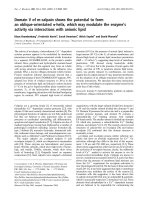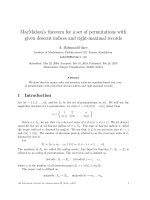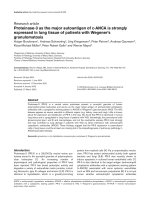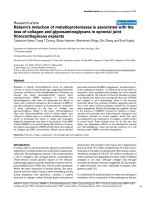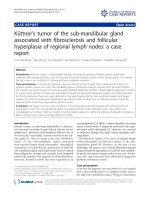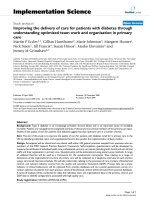Cambodia''s Constitution of 1993 with Amendments through 2008
Bạn đang xem bản rút gọn của tài liệu. Xem và tải ngay bản đầy đủ của tài liệu tại đây (196.47 KB, 36 trang )
<span class="text_page_counter">Trang 1</span><div class="page_container" data-page="1">
This complete constitution has been generated from excerpts of texts from the repository of the
<b>Comparative Constitutions Project, and distributed on constituteproject.org.</b>
<b>Cambodia's Constitution of1993 with Amendments</b>
<b>through 2008</b>
</div><span class="text_page_counter">Trang 3</span><div class="page_container" data-page="3"><small>•Source of constitutional authority</small>
<small>•Motives for writing constitution</small>
<small>•Reference to country's history</small>
WE, THE PEOPLE OF CAMBODIA
Being the heirs of a great civilization, a prosperous, powerful, large and glorious nation whose prestige radiated like a diamond;
Having endured suffering and destruction and having experienced a tragic decline in the course of last two decades;
Having awakened to stand up with resolute determination and commitment to strengthen our national unity, to preserve and defend Cambodia's territory and its precious sovereignty and the prestige of Angkor civilization, to build the nation up to again be an "Island of Peace" based on a liberal multi-party democratic system, to guarantee human rights and the respect of law, and to be responsible for progressively developing the prosperity and glory of our nation.
WITH THIS RESOLUTE WILL
We inscribe the following as the Constitution of the Kingdom of Cambodia:
<b>Chapter I: Sovereignty</b>
<b>Article 1</b>
Cambodia is a Kingdom in which the King shall rule according to the Constitution and the principles of liberal multi-party democracy.
<small>•Duty to obey the constitution</small>
<small>•Name/structure of executive(s)</small>
<small>•Type of government envisioned</small>
The Kingdom of Cambodia shall be an independent, sovereign, peaceful, permanently neutral and non-aligned country.
<b>Article 2</b>
The territorial integrity of the Kingdom of Cambodia shall never be violated within its borders as defined in the 1/100,000 scale map made between the years 1933-1953, and internationally recognized between the years 1963-1969.
<small>•Official or national languages</small>
The official language and script is Khmer.
<b>Article 6</b>
<small>•National anthem</small>
<small>•National capital</small>
<small>•National flag</small>
Phnom Penh is the capital city of the Kingdom of Cambodia. The national flag, anthem and coat-of-arms are defined in Annex 1, 2, and 3.
</div><span class="text_page_counter">Trang 4</span><div class="page_container" data-page="4"><b>Chapter II: The King</b>
<b>Article 7</b>
<small>•Name/structure of executive(s)</small>
The King of Cambodia reigns but does not govern.
The King shall be the Head of State for life. The King shall be inviolable.
<small>•Head of state immunity</small>
<b>Article 8</b>
The King of Cambodia is a symbol of the unity and eternity of the nation.
The King is the guarantor of national independence, the sovereignty and territorial integrity of the Kingdom of Cambodia and the guarantor of the rights and freedom of all citizens and of international treaties.
<small>•Head of state selection</small>
The Cambodian monarchy is an elected regime. The King shall have no power to appoint his successor to reign
<b>Article 11</b>
If the King cannot perform his normal duties as the Head of State due to His serious illness as certified by doctors chosen by the President of the Senate, the President of the National Assembly and the Prime Minister, the President of the Senate shall perform the duties of the Head of State as the King's Regent.
If the President of the Senate cannot perform the duties of the Head of State for the King as the King's Regent when the King is seriously ill as stipulated in the previous paragraph, the President of National Assembly shall perform these duties.
The position as the Head of State as the King's Regent may be taken by other dignitaries, in the circumstances described in the previous paragraph, in the
<small>•Head of state replacement</small>
When the King dies, the President of the Senate shall perform the duties of the Acting Head of State as the Regent of the Kingdom of Cambodia.
</div><span class="text_page_counter">Trang 5</span><div class="page_container" data-page="5">If, when the King dies, the President of the Senate cannot perform the duties of the Acting Head of State in place of the King, the responsibilities of Acting Head of State in the capacity of Regent shall be exercised in compliance with the second and third paragraph of Article 11 .
<b>Article 13</b>
<small>•Head of state selection</small>
<small>•Advisory bodies to the head of state</small>
<small>•Head of state replacement</small>
Within a period of not more than seven days, the Council of the Throne shall choose a new King of the Kingdom of Cambodia.
The Royal Council of the Throne shall consist of:
<b>•</b> The President of the National Assembly
and Theravada Buddhism (ThammayutekakNikay)
<b>•</b> The First and Second Vice-President of the Senate
<b>•</b> The First and Second Vice-President of the National Assembly
The organization and functioning of the Council of the Throne shall be determined by law.
<b>Article 14</b>
<small>•Minimum age of head of state</small>
<small>•Head of state selection</small>
<small>•Eligibility for head of state</small>
The King of Cambodia shall be member of the Royal family, be at least 30 years old and descend from the bloodline of King Ang Duong, King Norodom or King Sisowath. Upon enthronement, the King shall take an Oath of Allegiance as stipulated in Annex
The Queen of the Kingdom of Cambodia shall not have the right to engage in politics, to assume the role of Head of State or Head of Government, or to assume other administrative or political roles.
The Queen of the Kingdom of Cambodia exercises duties that serve social, humanitarian and religious interests and assists the King with protocol and diplomatic functions.
<b>Article 17</b>
<small>•Unamendable provisions</small>
The provision of paragraph 1 of Article 7 of this Constitution, under which the King reigns but does not govern, shall never be amended.
<b>Article 18</b>
The King shall communicate with the Senate and the National Assembly by royal messages.
</div><span class="text_page_counter">Trang 6</span><div class="page_container" data-page="6">These royal messages shall not be subject to discussion by the Senate and the National Assembly.
<b>Article 19</b>
<small>•Cabinet selection</small>
<small>•Name/structure of executive(s)</small>
<small>•Head of government selection</small>
The King shall appoint the Prime Minister and the Council of Ministers in accordance with the procedures stipulated in Article 119.
<b>Article 20</b>
The King shall grant official audiences twice a month to the Prime Minister and the Council of Ministers to hear their reports on the current situation of the nation.
<b>Article 21</b>
Upon the request of the Council of Ministers, the King shall sign Royal Decrees (Reach Kret) appointing, transferring or removing from office, senior civil and military officials, ambassadors and envoys extraordinary and plenipotentiary. Upon the request of the Supreme Council of the Magistracy, the King shall sign Royal Decrees appointing, transferring or terminating the appointment of judges.
<b>Article 22</b>
<small>•Emergency provisions</small>
When the nation faces danger the King, with the joint approval of the Prime Minister, the President of the National Assembly and the President of the Senate, shall make a proclamation to the people putting the country into a state of emergency.
<b>Article 23</b>
<small>•Designation of commander in chief</small>
The King is the Supreme Commander of the Royal Khmer Armed Forces. The Commander-in-Chief of the Royal Khmer Armed Forces shall be appointed to command the Armed Forces.
<b>Article 24</b>
The King shall serve as Chairman of the Supreme Council of National Defense, to be established by law.
<small>•Advisory bodies to the head of state</small>
With the approval of the National Assembly and the Senate, the King shall declare war
<small>•Power to declare/approve war</small>
<b>Article 25</b>
<small>•Foreign affairs representative</small>
<small>•Head of state powers</small>
The King shall receive letters of credential from ambassadors or envoys extraordinary and plenipotentiary of foreign countries accredited to the Kingdom of
The King shall sign and ratify international treaties and conventions after they have been approved by the National Assembly and the Senate.
</div><span class="text_page_counter">Trang 7</span><div class="page_container" data-page="7"><b>Article 27</b>
<small>•Power to pardon</small>
The King shall have the rights to grant pardons or amnesties.
<b>Article 28</b>
The King shall sign Royal proclamations promulgating the Constitution and laws passed by the National Assembly and completely reviewed by the Senate, and shall sign any Royal Decrees proposed by the Council of Ministers.
If the King is sick and requires medical treatment abroad, He has the rights to delegate the power of signing Royal proclamations and Royal Decrees to the Acting Head of State by delegating writs.
<b>Article 29</b>
<small>•Head of state powers</small>
The King establishes and confers national decorations. The King confers civil and military ranks and positions as determined by law.
<small>•Selection of active-duty commanders</small>
<b>Article 30</b>
In the absence of the King, the President of the Senate shall assume the duties of Acting Head of State. If the President of the Senate cannot perform his duties as the Acting Head of State in place of the King, at the time of the King's absence, the responsibilities of Acting Head of State shall be exercised in compliance with the second and third paragraphs of Article 11.
<b>Chapter III: The Rights and Obligations ofKhmer Citizens</b>
<b>Article 31</b>
The Kingdom of Cambodia recognizes and respects human rights as stipulated in the United Nations Charter, the Universal Declaration of Human Rights and the covenants and conventions related to human rights, women's rights and children's rights.
<small>•International human rights treaties</small>
Khmer citizens shall be equal before the law, enjoying the same rights and freedom and obligations regardless of race, color, sex, language, religious belief, political tendency, national origin, social status, wealth or other status. The exercise of personal rights and freedom by any individual shall not adversely affect the rights and freedom of others. The exercise of such rights and freedom shall be in accordance with the law.
<small>•General guarantee of equality</small>
<small>•Equality regardless of gender</small>
<small>•Equality regardless of skin color</small>
<small>•Equality regardless of social status</small>
<small>•Equality regardless of financial status</small>
<small>•Equality regardless of political party</small>
<small>•Equality regardless of origin</small>
<small>•Equality regardless of race</small>
<small>•Equality regardless of language</small>
<small>•Equality regardless of religion</small>
<b>Article 32</b>
<small>•Right to life</small>
Everybody shall have the rights to life, freedom, and personal security. Capital punishment is prohibited.
<small>•Prohibition of capital punishment</small>
</div><span class="text_page_counter">Trang 8</span><div class="page_container" data-page="8"><b>Article 33</b>
Khmer citizens shall not be deprived of their nationality, or exiled, or arrested and deported to any foreign country, unless there is a mutual agreement.
<small>•Power to deport citizens</small>
<small>•Conditions for revoking citizenship</small>
<small>•Extradition procedure</small>
Khmer citizens residing abroad shall be protected by the State. The acquisition of Khmer nationality shall be determined by law.
<small>•Requirements for birthright citizenship</small>
<small>•Requirements for naturalization</small>
<b>Article 34</b>
Khmer citizens of either sex shall enjoy the rights to vote and to stand as candidates for an election.
<small>•Claim of universal suffrage</small>
Khmer citizens of either sex who are at least eighteen years old shall have the rights to vote.
<small>•Restrictions on voting</small>
Khmer citizens of either sex who are at least twenty-five years old shall have the rights to stand as candidates for the National Assembly elections.
<small>•Minimum age for first chamber</small>
<small>•Eligibility for first chamber</small>
Khmer citizens of either sex who are at least forty years old shall have the rights to stand as candidates for the Senate elections.
<small>•Minimum age for second chamber</small>
<small>•Eligibility for second chamber</small>
Restrictions on the rights to vote and the rights to stand as candidates in elections shall be determined by an electoral law.
<small>•Restrictions on voting</small>
<b>Article 35</b>
Khmer citizens of either sex shall have the rights to participate actively in the political, economic, social and cultural life of the nation.
All requests from citizens shall be thoroughly considered and resolved by institutions of the state.
<small>•Right of petition</small>
<b>Article 36</b>
Khmer citizens of either sex shall enjoy the rights to choose any employment according their ability and to the needs of the society.
<small>•Right to choose occupation</small>
Khmer citizens of either sex shall receive equal pay for the same work.
<small>•Right to equal pay for work</small>
Housework shall have the same value as work outside the home.
Khmer citizens of either sex shall have the rights to obtain social security and other social benefits as determined by law.
<small>•General guarantee of social security</small>
Khmer citizens of either sex shall have the rights to form and to be members of trade unions.
<small>•Right to join trade unions</small>
The organization and functioning of trade unions shall be determined by law.
<b>Article 37</b>
<small>•Right to strike</small>
The rights to strike and to organize peaceful demonstrations shall be implemented and exercised within the framework of law.
<b>Article 38</b>
The law prohibits all physical abuse of any individual.
<small>•Prohibition of corporal punishment</small>
The law protects the life, honor and dignity of citizens.
<small>•Human dignity</small>
<small>•Right to protect one's reputation</small>
</div><span class="text_page_counter">Trang 9</span><div class="page_container" data-page="9">No person shall be accused, arrested, or detained except in accordance with the law.
<small>•Protection from unjustified restraint</small>
<small>•Principle of no punishment without law</small>
The coercion, physical ill-treatment or any other mistreatment which imposes additional punishment on a detainee or prisoner is prohibited. Persons who commit, participate in or conspire in such acts shall be punished according to the law.
<small>•Prohibition of cruel treatment</small>
Confessions obtained by physical or mental force shall not be admissible as evidence of guilt.
<small>•Regulation of evidence collection</small>
<small>•Prohibition of torture</small>
The accused shall have the benefit of any reasonable doubt.
<small>•Presumption of innocence in trials</small>
Any accused shall be presumed to be innocent until they are finally convicted by the court.
<small>•Presumption of innocence in trials</small>
Everybody shall have the rights to defend him/herself through the judicial system.
<small>•Right to counsel</small>
<b>Article 39</b>
<small>•Ultra-vires administrative actions</small>
<small>•Right of petition</small>
Khmer citizens have the rights to denounce, make complaints, or claim for compensation for damages caused by any breach of the law by institutions of the state, social organizations or by members of such organizations. The settlement of complaints and claims for compensation for damages is the responsibility of the
The rights to privacy of residence, and to the confidentiality of correspondence by mail, telegram, fax, telex and telephone, shall be guaranteed.
<small>•Regulation of evidence collection</small>
Khmer citizens shall have freedom of expression of their ideas, freedom of information, freedom of publication and freedom of assembly. No one shall exercise these rights to infringe upon the honor of others, or to affect the good customs of society, public order and national security.
The regime of the media shall be determined by law.
<b>Article 42</b>
<small>•Freedom of association</small>
<small>•Restrictions on political parties</small>
<small>•Right to form political parties</small>
Khmer Citizens have the rights to establish associations and political parties. These rights shall be determined by law.
Khmer citizens may take part in mass organizations to work together to protect national achievement and social order.
<b>Article 43</b>
<small>•Freedom of religion</small>
<small>•Freedom of opinion/thought/conscience</small>
Khmer citizens of either sex shall have the rights to freedom of belief.
Freedom of belief and religious worship shall be guaranteed by the State on the condition that such freedom does not affect other beliefs and religions or violate public order and security.
</div><span class="text_page_counter">Trang 10</span><div class="page_container" data-page="10">Buddhism shall be the religion of the State.
<small>•Official religion</small>
<b>Article 44</b>
<small>•Right to own property</small>
All persons, individually or collectively, shall have the rights to own property. Only natural persons or legal entities of Khmer nationality shall have the rights to own land.
Legal private ownership shall be protected by law.
Expropriation of ownership from any person shall be exercised only in the public interest as provided for by law and shall require fair and just compensation in advance.
<small>•Protection from expropriation</small>
<b>Article 45</b>
<small>•Equality regardless of gender</small>
All forms of discrimination against women shall be abolished. The exploitation of women in employment is prohibited.
Men and women are equal in all fields especially with respect to marriage and family matters.
<small>•Right to marry</small>
<small>•Provision for matrimonial equality</small>
Marriage shall be conducted according to law, based on the principle of mutual consent between one husband and one wife.
<small>•Right to marry</small>
<b>Article 46</b>
Trading human beings, the exploitation of prostitution and obscenity, which affect the reputation of women, shall be prohibited.
The termination of a woman's employment because of her pregnancy is prohibited. Women shall have the rights to take maternity leave with full pay and with no loss of seniority or other social benefits.
The State and society shall provide opportunities to women, especially for those living in rural areas without adequate social support, so that they can obtain employment and medical care, send their children to school and have decent living
<small>•Limits on employment of children</small>
The State shall protect the rights of children as stipulated in the Convention on Children, in particular, the rights to life, education, protection during wartime, and protection from economic or sexual exploitation.
<small>•International human rights treaties</small>
The State shall protect children from any forms of labor that are injurious to their educational opportunities, health and welfare.
<b>Article 49</b>
Every Khmer citizen shall respect the Constitution and the laws.
<small>•Duty to obey the constitution</small>
</div><span class="text_page_counter">Trang 11</span><div class="page_container" data-page="11">Every Khmer citizen has a duty to take part in national reconstruction and to defend the motherland. The duty to defend the motherland shall be exercised in accordance with law.
<small>•Duty to serve in the military</small>
<b>Article 50</b>
Khmer citizens of either sex shall respect the principles of national sovereignty and liberal multi-party democracy.
Khmer citizens of either sex shall respect public property and legally acquired private property.
<b>Chapter IV: The Political System</b>
<b>Article 51</b>
The Kingdom of Cambodia adopts a liberal multi-party democratic policy. Khmer citizens are the masters of their own country.
All power belongs to the citizens. The citizens exercise their powers through the National Assembly, the Senate, the Royal Government and the Judiciary.
The legislative, executive and judicial powers shall be separate.
<small>•Claim of executive independence</small>
<small>•Judicial independence</small>
<b>Article 52</b>
<small>•General guarantee of social security</small>
<small>•Right to reasonable standard of living</small>
The Royal Government of Cambodia shall protect the independence, sovereignty and territorial integrity of the Kingdom of Cambodia, adopt a policy of national reconciliation to ensure national unity, and preserve good customs and traditions of the nation. The Royal Government of Cambodia shall preserve and protect legality and ensure public order and security. The State shall give priority to improving the welfare and standard of living of citizens.
<b>Article 53</b>
<small>•Restrictions on the armed forces</small>
The Kingdom of Cambodia adopts policy of permanent neutrality and non-alignment. The Kingdom of Cambodia follows a policy of peaceful co-existence with its neighbors and with all other countries throughout the world.
The Kingdom of Cambodia shall not invade any country, nor interfere in any other country's internal affairs, directly or indirectly, and shall solve any problems peacefully with due respect for mutual interests.
The Kingdom of Cambodia shall not join in any military alliance or military pact that is incompatible with its policy of neutrality.
The Kingdom of Cambodia shall not permit any foreign military base on its territory and shall not have its own military base abroad, except within the framework of a United Nations' request.
The Kingdom of Cambodia reserves the rights to receive foreign assistance in the form of military equipment, armaments, ammunitions, training of its armed forces and other assistance for self-defense and for maintaining public order and security within its territory.
</div><span class="text_page_counter">Trang 12</span><div class="page_container" data-page="12"><small>•Legal status of treaties</small>
Any treaty and agreement incompatible with the independence, sovereignty, territorial integrity, neutrality and national unity of the Kingdom of Cambodia, shall be annulled.
<b>Chapter V: Economy</b>
<b>Article 56</b>
<small>•Right to competitive marketplace</small>
The Kingdom of Cambodia adopts a market economy system.
The organization and functioning of this economic system shall be determined by
<small>•Ownership of natural resources</small>
State property comprises land, underground mineral resources, mountains, sea, undersea, continental shelf, coastline, airspace, islands, rivers, canals, streams, lakes, forests, natural resources, economic and cultural centers, bases for national defense and other buildings determined as State property.
The control, use and management of State properties shall be determined by law.
<b>Article 59</b>
<small>•Protection of environment</small>
<small>•Ownership of natural resources</small>
The State shall protect the environment and the balance of natural resources and establish a precise plan for the management of land, water, airspace, wind, geology, ecological systems, mines, oil and gas, rocks and sand, gems, forests and forestry products, wildlife, fish and aquatic resources.
<b>Article 60</b>
Citizens shall have the rights to freely sell their products. The obligation to sell products to the State or the temporary use of private property or products by the State shall be prohibited unless authorized by law under special circumstances.
</div><span class="text_page_counter">Trang 13</span><div class="page_container" data-page="13"><b>Article 61</b>
The State shall promote economic development in all sectors and particularly in remote areas, especially in agriculture, handicrafts and industry, with attention to policies on water, electricity, roads and means of transportation, modem technology and credit systems.
<b>Article 62</b>
The State shall pay attention to and help improve the means of production, protect the price of products for farmers and crafters and find marketplaces for them to sell their products.
<b>Article 63</b>
<small>•Right to competitive marketplace</small>
<small>•Right to reasonable standard of living</small>
The State shall pay attention to marketing in order to improve citizens' living standard to a decent level.
<b>Article 64</b>
<small>•Protection of consumers</small>
The State shall ban the importation, manufacture and sale of illicit drugs, counterfeit or expired goods and severely punish those who import, manufacture or sell illicit drugs, counterfeit or expired goods, which affect the health and life of consumers.
<b>Chapter VI: Education, Culture, and SocialAffairs</b>
<b>Article 65</b>
The State shall protect and promote citizens' rights to quality education at all levels and shall take all measures, step by step, to make quality education available to all citizens.
The State shall pay attention to physical education and sports for the welfare of all Khmer citizens.
<b>Article 66</b>
<small>•Right to academic freedom</small>
The State shall establish a comprehensive and standardized educational system throughout the country which shall guarantee the principles of freedom to operate educational institutions and equal access to education in order to ensure that all citizens have an equal opportunity to earn a living.
<b>Article 67</b>
The State shall adopt an educational program and the principles of modern pedagogy which encompass technology and foreign languages.
The State shall control public and private educational institutions and classrooms at all levels.
</div><span class="text_page_counter">Trang 14</span><div class="page_container" data-page="14">The State shall preserve and promote national culture.
The State shall protect and promote the Khmer language as required.
The State shall preserve ancient temples and artifacts and redecorate historic sites.
The perimeter of national heritage sites including those classified as world heritage sites shall be considered as neutral zones where there shall be no military activity.
<b>Article 72</b>
<small>•Right to health care</small>
The health of the people shall be guaranteed. The State shall pay attention to disease prevention and medical treatment. Poor people shall receive free medical consultations in public hospitals, infirmaries and maternity clinics.
The State shall establish infirmaries and maternity clinics in rural areas.
<b>Article 73</b>
<small>•State support for children</small>
The State shall pay attention to children and mothers. The State shall establish nurseries and help support women who have numerous children and have inadequate support.
<b>Article 74</b>
<small>•State support for the disabled</small>
The State shall help support the disabled and the families of combatants who sacrificed their lives for the nation.
<b>Article 75</b>
<small>•General guarantee of social security</small>
The State shall establish a social security system for workers and employees.
<b>Chapter VII: The National Assembly</b>
<b>Article 76</b>
<small>•Structure of legislative chamber(s)</small>
</div><span class="text_page_counter">Trang 15</span><div class="page_container" data-page="15">The National Assembly shall consist of at least 120 Members.
<small>•Size of first chamber</small>
The Members shall be elected by a free, universal, equal, direct and secret ballot.
<small>•Secret ballot</small>
<small>•First chamber selection</small>
The Members may be re-elected.
Candidates for election to the National Assembly shall be Khmer citizens of either sex, have the rights to vote, be at least 25 years of age and have Khmer nationality at birth.
<small>•Eligibility for cabinet</small>
<small>•Minimum age for first chamber</small>
<small>•Eligibility for first chamber</small>
The organization responsible for conducting the election, electoral procedures and processes shall be determined by an electoral law.
<b>Article 77</b>
The Members of the National Assembly shall represent all the Khmer people, not only citizens from their constituencies.
Any imperative mandate shall be nullified.
<b>Article 78</b>
The term of the National Assembly is five years and ends on the day when the new National Assembly takes office.
<small>•Head of government term length</small>
<small>•Term length for first chamber</small>
The National Assembly shall not be dissolved before the end of its term except when the Royal Government is twice deposed within a period of twelve months. In this case, the King shall dissolve the National Assembly, upon a request by the Prime Minister and with the approval of the President of the National Assembly.
<small>•Dismissal of the legislature</small>
The election of new National Assembly shall be held no later than sixty days from the date of dissolution. During this period, the Royal Government shall only be empowered to conduct routine business.
<small>•Scheduling of elections</small>
In time of war or other special circumstances when an election cannot be held, the National Assembly may extend its term for one year at time, at the request of the King.
The declaration of an extension of the National Assembly's term must be approved by at least a two-thirds majority vote of all Members of the National Assembly.
<b>Article 79</b>
<small>•Head of government's role in thelegislature</small>
<small>•Outside professions of legislators</small>
A Member of the National Assembly shall not hold any active public function and be a member of other institutions provided for in the Constitution, except when a National Assembly Member is required to serve in the Council of Ministers of the Royal Government.
In this case, the said National Assembly Member shall remain a Member of the National Assembly but may not hold any position on the Standing Committee or on other Commissions of the National Assembly.
<small>•Legislative committees</small>
<small>•Standing committees</small>
<b>Article 80</b>
<small>•Immunity of legislators</small>
Members of the National Assembly shall enjoy parliamentary immunity.
No Member of the National Assembly shall be prosecuted, detained or arrested because of opinions expressed in the exercise of his/her duties.
A Member of the National Assembly may only be prosecuted, arrested or detained with the permission of the National Assembly or by the Standing Committee of the National Assembly between sessions, except in case of flagrant delicto offences. In
</div><span class="text_page_counter">Trang 16</span><div class="page_container" data-page="16">that case, the competent authority shall immediately report to the National Assembly or to the Standing Committee and request permission.
The decision of the Standing Committee of the National Assembly shall be submitted to the National Assembly at its next session, for approval by a two thirds majority vote of all Members of the National Assembly.
<small>•Standing committees</small>
In any case, the detention or prosecution of a Member of the National Assembly shall be suspended if the National Assembly requires that the detention or prosecution be suspended by a three quarter majority vote of all Members of the National
The National Assembly shall hold its initial session no later than sixty days after the election, and as convened by the King.
Before starting its work, the National Assembly shall confirm the validity of each Member's mandate and vote separately to choose its President, Vice-Presidents and all members of various Commissions of the National Assembly, by an absolute majority vote of all Members of the National Assembly.
<small>•Legislative committees</small>
<small>•Leader of first chamber</small>
The National Assembly shall adopt its internal regulations by an absolute majority vote of all Members of the National Assembly.
All National Assembly Members shall, before taking office, take an Oath of Allegiance as contained in Annex 5 of this Constitution.
<small>•Oaths to abide by constitution</small>
<b>Article 83</b>
<small>•Length of legislative sessions</small>
The National Assembly holds ordinary sessions twice year.
Each session shall last at least three months. At the request of the King, or the Prime Minister, or at least one third of the National Assembly Members, the National Assembly Standing Committee shall convene in an extraordinary session of the
Between National Assembly sessions, the Standing Committee of the National Assembly shall manage the work of the National Assembly.
The Standing Committee of the National Assembly consists of the President of the National Assembly, the Vice-Presidents and all Chairpersons of the National Assembly Commissions.
<small>•Legislative committees</small>
<b>Article 85</b>
The National Assembly sessions shall be held in the Capital city of Cambodia in the Assembly Hall unless, due to special circumstances, stipulated otherwise in the
</div><span class="text_page_counter">Trang 17</span><div class="page_container" data-page="17">Except where so stipulated and unless held at the place and date as stipulated, any meeting of the National Assembly shall be considered completely illegal, null and void.
<b>Article 86</b>
<small>•Emergency provisions</small>
Under some circumstances when the country is in a state of emergency, the National Assembly shall meet every day. The National Assembly has the rights to declare the above special circumstances terminated whenever the situation permits.
If the National Assembly is not able to meet because of circumstances such as the occupation of the country by foreign forces, the declaration of the state of emergency is automatically extended.
During the state of emergency, the National Assembly shall not be dissolved.
<b>Article 87</b>
<small>•Leader of first chamber</small>
The President of the National Assembly shall chair the assembly sessions, receive draft bills and resolutions approved by the National Assembly, ensure the implementation of the Internal Regulations and organize the international relations of the National Assembly.
If the President of the National Assembly is unable to perform his/her duties due to illness, or due to fulfilling of the functions of Acting Head of State or as a Regent, or due to being on a mission abroad, a Vice-President shall replace him.
If the President or a Vice-President resigns or dies, the National Assembly shall elect a new President or Vice-President.
<b>Article 88</b>
The National Assembly sessions shall be held in public.
<small>•Public or private sessions</small>
At the request of the President or of at least one tenth of its Members, or of the King or of the Prime Minister, the National Assembly shall hold closed sessions.
Sessions of the National Assembly shall be considered valid, only if:
<small>•Quorum for legislative sessions</small>
Members, for any votes which require a two-thirds majority of all Members.
<b>B.</b> There is a quorum of more than a half of all National Assembly Members for any votes which require an absolute majority of all Members.
<b>Article 89</b>
Upon the request of at least one tenth of its Members, the National Assembly shall invite high ranking officials to clarify important special issues to the National Assembly.
<b>Article 90</b>
<small>•First chamber reserved policy areas</small>
The National Assembly is an organ that has a legislative power and performs its duties as provided for in the Constitution and laws in force.
</div><span class="text_page_counter">Trang 18</span><div class="page_container" data-page="18">The National Assembly shall approve the national budget, State planning, lending, borrowing, financial contracts, and the imposition, modification or abolition of taxes. The National Assembly shall approve administration accounts.
The National Assembly shall adopt the law on general amnesty.
The National Assembly shall approve or repeal international treaties and conventions.
<small>•International law</small>
<small>•Treaty ratification</small>
The National Assembly shall adopt a law on the proclamation of war.
<small>•Power to declare/approve war</small>
The adoptions and approvals referred to in the previous clauses shall be agreed by an absolute majority vote of all Members of the National Assembly.
The National Assembly shall pass a vote of confidence in the Royal Government by an absolute majority vote of all Members.
<small>•Cabinet removal</small>
<small>•Head of government removal</small>
<b>Article 91</b>
<small>•Initiation of general legislation</small>
The Senators, the Members of the National Assembly and the Prime Minister shall have the rights to initiate legislation.
Members of the National Assembly shall have the rights to propose amendments to the laws but proposed amendments cannot be accepted if they might have the effect of reducing public income or increasing the burden on the people.
<b>Article 92</b>
Any decision of the National Assembly that contradicts the principles of preserving national independence, sovereignty, territorial integrity of the Kingdom of Cambodia and affects the political unity or the administration of the nation, shall be annulled. The Constitutional Council is the only organ which may annul the decision.
<b>Article 93</b>
<small>•Division of labor between chambers</small>
Any laws approved by the National Assembly, reviewed by the Senate and signed by the King for promulgation, shall come into force in Phnom Penh ten days after the date of promulgation and throughout the rest of the country twenty days after the date of promulgation.
If the law is stipulated as urgent, it shall come into force throughout the country immediately after promulgation.
Laws that are signed by the King for promulgation shall be published in the Royal Gazette and announced to the public throughout the country in accordance with the time-frame set out above.
<b>Article 94</b>
<small>•Legislative committees</small>
The National Assembly may establish such commissions as it considers necessary. The organization and functioning of the National Assembly shall be determined by the Internal Regulations of the National Assembly.
<b>Article 95</b>
<small>•Replacement of legislators</small>
<small>•Removal of individual legislators</small>
If a Member of the National Assembly dies, resigns, or is dismissed more than six months before the end of the term of the National Assembly, a replacement shall be appointed in accordance with the Internal Regulations of the National Assembly and the Electoral Law.
</div>

